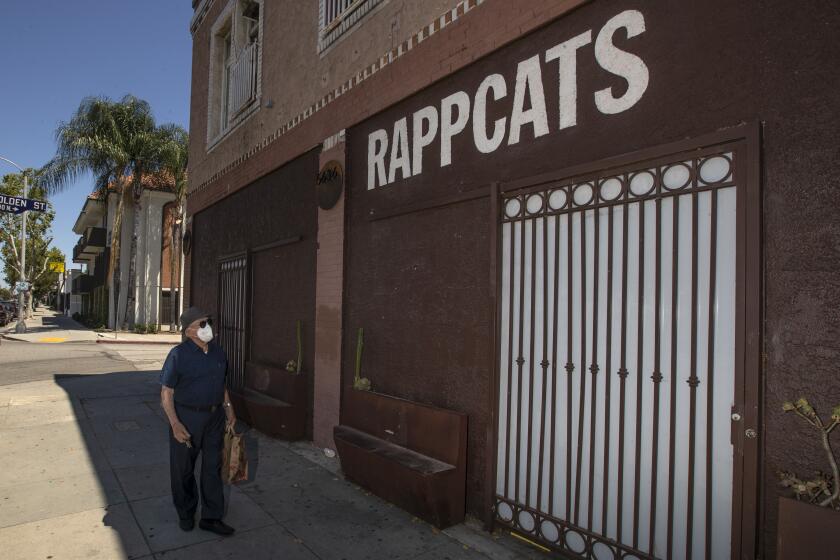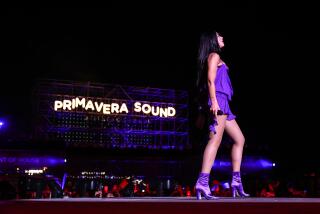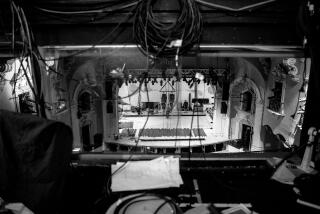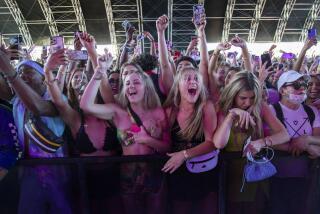At SoCal’s drive-in concerts, fans, artists and promoters make the best of a live-music apocalypse
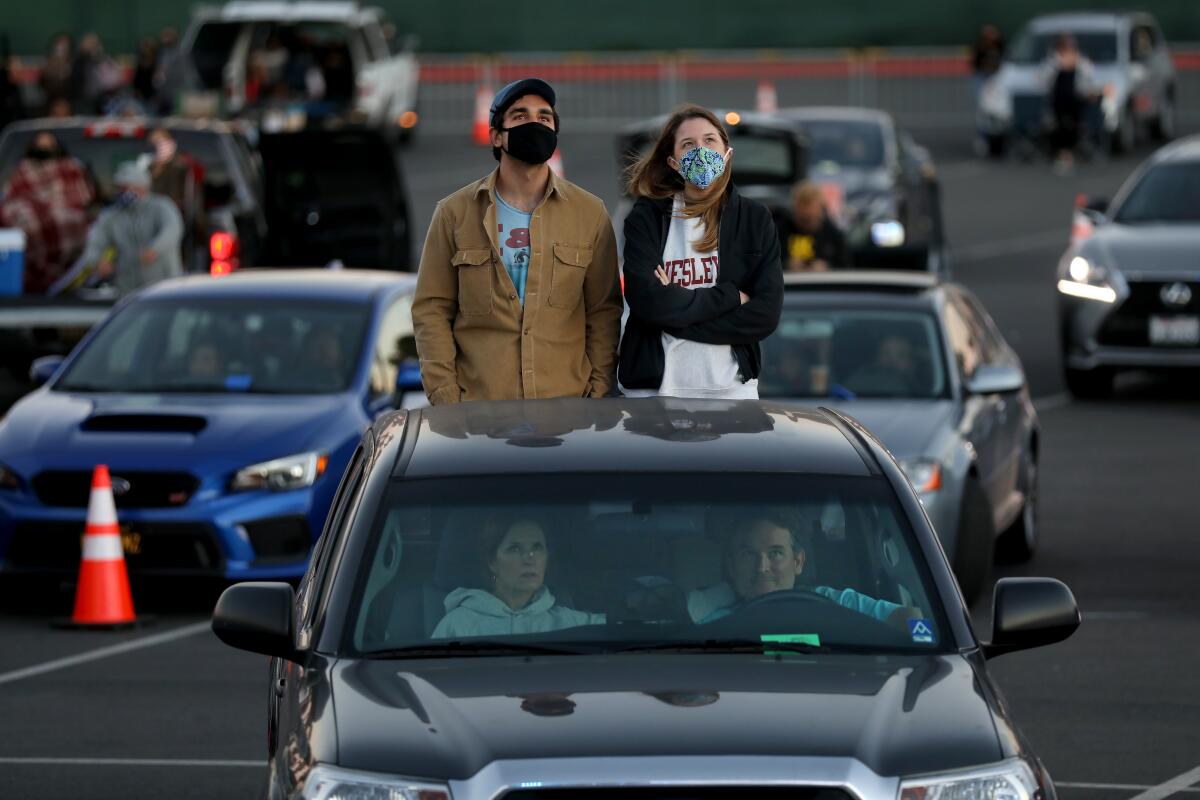
- Share via
If you closed your eyes and leaned back in your car seat Saturday night at the Ventura County Fairgrounds, you’d have smelled the cool salt air and heard the manic ska-funk-punk of L.A.’s Fishbone and Ozomatli. You’d have almost felt like live music was back to normal in Southern California.
At the show, one of the region’s first drive-in concerts bringing live music back during the COVID-19 pandemic, cars encircled the main stage, plonked in the middle of the outdoor venue’s vast seaside parking lot (fans in the back could view the show on big LED screens).
Some families, donning face masks, climbed on the roofs of their cars to get an optimal view, while others stayed in, clandestinely tailgating with takeout pizza. Over a well-synced FM radio signal, Fishbone played its ageless hits — “Party at Ground Zero,” “Lyin’ Ass Bitch” — with extra verve to rouse those in attendance in the 500 cars at the show. Concertgoers honked their approval at the end of songs.
Highland Park has long been the heart of L.A.’s musical bohemia, home to Chicano punk and Billie Eilish. Now, COVID-19 threatens the scene’s very existence.
It was a bit like Coachella, if no one left their vehicles, or the Hollywood Bowl, if they brought the stage out to meet the Highland Avenue traffic. For the time being, and for who knows how long beyond that, it’ll likely be the only way we see shows in SoCal.
“2022 feels realistic about being back to normal,” lamented Vincenzo Giammanco, the founder of CBF Productions, which produces the Concerts in Your Car series at the Ventura County Fairgrounds. “But there will be creative adaptations.”
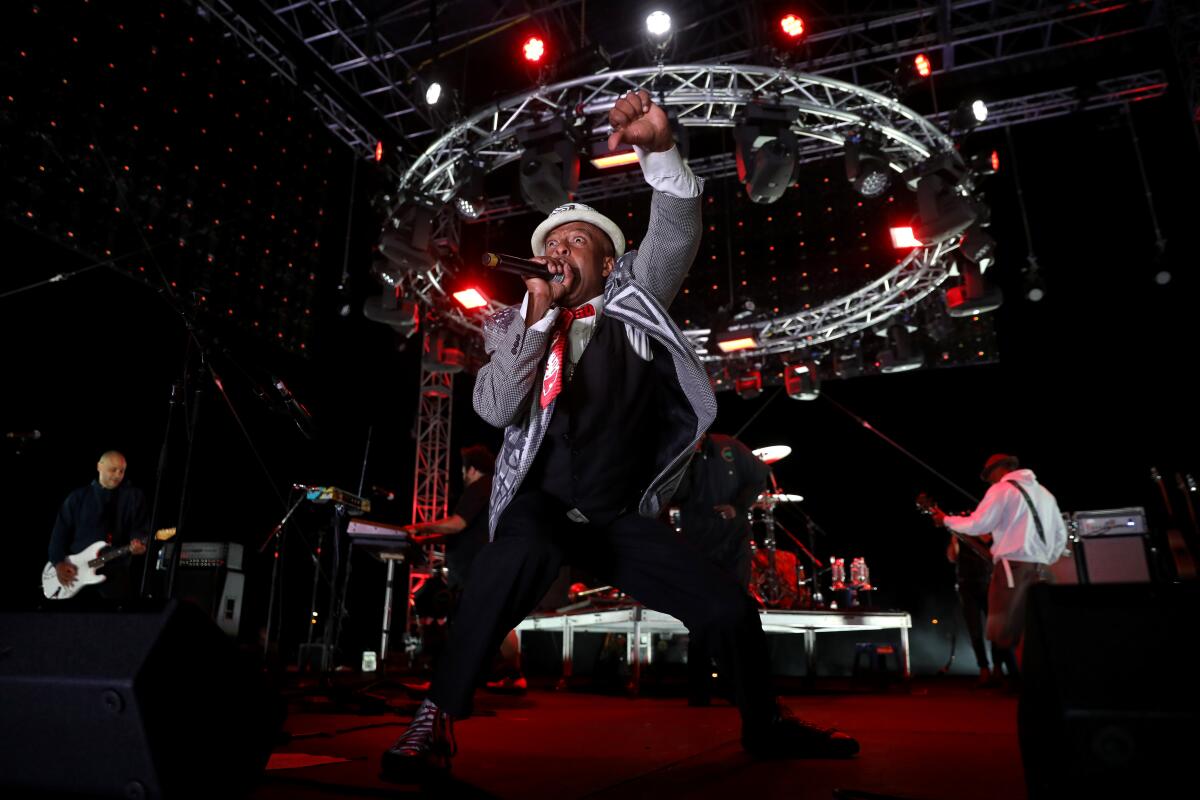
As COVID-19 explodes across much of the country, including California, the live music business may be falling off a cliff. California has more than 400,000 confirmed cases and 7,779 deaths from COVID-19. Former WME music head Marc Geiger recently said he didn’t expect large shows to return for another year and a half at the soonest. Major promoters like AEG have laid off or cut pay for much of its workforce; small venues like the Satellite have announced the end of live music in their storied rooms; and music-driven neighborhoods like Highland Park may struggle to fully recover. Companies like Spotify, Universal Music Group and Warner Music Group have redoubled their lobbying efforts with the National Independent Venue Assn. to try and protect music venues from total collapse, in part by supporting the Restart Act, a bill in Congress that would extend and bolster the Paycheck Protection Program.
With supplemental unemployment benefits drying up at the end of the month, and few expectations for additional entertainment-specific aid packages, promoters have had to find workarounds. Some have reached back into Southern California car culture for at least a temporary answer: drive-in concerts.
L.A.’s midcentury 20th culture was in a big way defined by drive-in attractions. In the 1950s, there was the popular Gilmore Drive-In, now the site of the Grove outdoor mall, while the Van Nuys Drive-In Theatre was lovingly re-created for “Once Upon a Time ... in Hollywood.” The city’s retro-futuristic Googie architecture came into its form to attract passing cars from freeways.
In the COVID-19 era, drive-in concerts were first mounted in Denmark, with an April set from singer Mads Langer. But if there’s anywhere in the world prepared to bring them back, it’s Southern California.
“I used to go to drive-ins when I was a kid. I never thought we’d see the day when you’d go to one to see a concert,” Angelo Moore, Fishbone’s founding singer and saxophonist, said the day before his Ventura show, which also featured sets from stalwart L.A. Latin rockers Ozomatli and Ventura’s Rey Fresco.
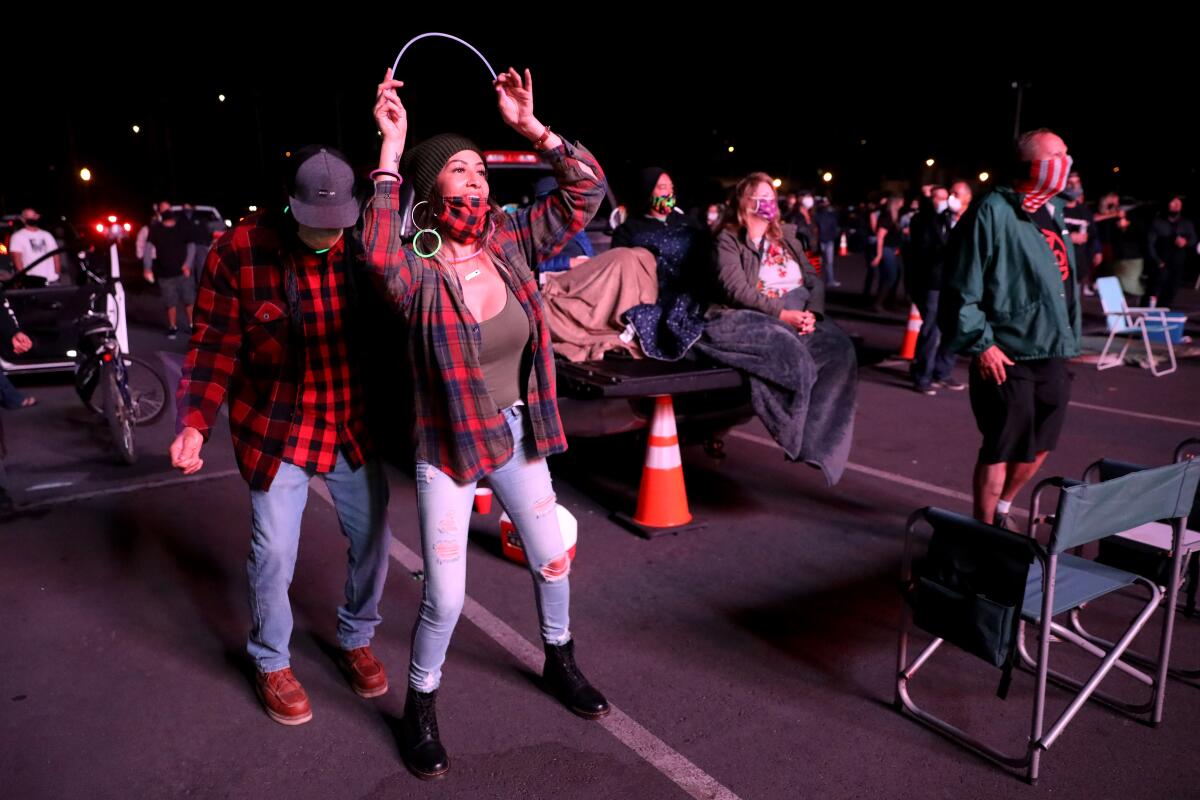
While some promoters have thrown caution to the wind and produced nondistanced, mask-free sets from country singers like Chase Rice and Chris Janson, the vast majority of touring acts and promoters have refrained from such shows. But Moore admitted that for a band like his that makes much of its living on the road, COVID-19 has been devastating.
“Ever since corona hit the scene, it’s been difficult to make a living. It is hard to plan for the future, so I guess God’s making us take a break whether we like it or not,” he said.
For Moore, Saturday’s show was both a fiscal and personal relief. “Entertainment’s been hurt badly, so people are glad to get together for music, even if from their cars, because there’s no other way,” he said.
Giammanco was even more blunt about COVID-19’s impact on concerts. “Catastrophic, I think that’s the right word,” he said. “There might not be any shows this year, and without any income, I had to furlough and lay off everybody. We went from thriving in 2019 to nothing.”
His company usually produces around 12 large events across California, including the popular Boots & Brews country music festival, which draws around 20,000 fans to Santa Clarita. After forming a plan for drive-in shows in April, Giammanco got a loan from the Paycheck Protection Program to restart his company for a few months, booked acts like Third Eye Blind, Fitz and the Tantrums and Sublime With Rome, and had to learn on the fly about what worked for a car show.
“It’s not like you can go to a show to figure it out first,” he said. “It’s kind of surreal.”
Emitt Rhodes, whose talents were compared to Paul McCartney’s but whose insistence on DIY music-making led to a 40-year recording drought, has died.
Safety protocols were visible and strict — patrons stayed close to their cars, masks were required, and staff is tested weekly for COVID-19.
The series is not a permanent replacement for live shows. These sets attract perhaps a tenth of the audience that a festival would bring in, and the sheer amount of space required for socially distanced cars puts a limit on capacity. With extra production costs and no concession sales, the margins are slimmer too. But so far, 33,000 people have attended various concerts, films and stage shows for the series, and hopefully, it will be enough to keep the lights on during a dark year.
“While it’s all upside down, we’re happy to be able to work,” Giammanco said. “A break from constant negativity is essential.”
Even the largest promoters might be counting on that format as a stopgap. Last month, Live Nation began its Live From the Drive-In series, a slate of nine concerts held across the Midwest, with acts like Brad Paisley, Darius Rucker, Jon Pardi and Nelly. Fans — around 1,000 cars for the St. Louis events, at about $125 per vehicle — could tailgate next to their vehicles.
Live Nation, the world’s largest concert promoter, has seen revenues collapse during the pandemic. Drive-in sets may be one way to keep employees on payroll and give artists — many of whom may be off the road for a year or more — with something approximating a return to performing.
Many acts are experimenting with the format. Garth Brooks, the Avett Brothers, Blake Shelton and Los Lobos have booked or performed drive-in sets across the country this summer. While drive-in shows have leaned toward country music and middle America, their footprint is growing: dance-music duo the Chainsmokers are headlining a drive-in charity benefit in the Hamptons next week, with tickets starting at $1,250 and going up to $25,000.
Drive-in concerts have also subbed for private or corporate concerts, wherein artists are handsomely compensated by a brand to perform for a select number of influential invitees.
Last week, German luxury car manufacturer Audi sponsored an intimate, invitation-only drive-in concert in Malibu featuring R&B artist Kehlani, billed as an event to honor front-line and essential workers. The lawn at Calamigos Ranch was filled with neat rows of gleaming new Audis (provided free as transport to each concertgoer), all of which faced the stage like a scene from Pixar’s “Cars” franchise.
“It’s nice to socially distantly meet y’all,” Kehlani said to the humans in attendance, among them NBA great Dwyane Wade and actor Gabrielle Union, who chose to watch (and dance) from the adjacent makeshift parking space allotted to each carload.
Kehlani and her band gamely debuted songs from her new album (“I haven’t sung for three months, because I’ve been in the house,” she said apologetically), but whether it was because the gathered weren’t paying fans or because cars can’t clap, the finish of each song was greeted not by the usual rapturous applause of a packed audience but by an eerie, depressing quiet.
Other venues have had more luck. Jordan Harding, general manager of the City National Grove of Anaheim, knew he was taking a gamble when he booked three drive-in sets from singer-songwriter Andrew McMahon last week. “A lot of artists were waiting to see the proof-of-concept,” Harding said. “But people are craving live entertainment now, and artists are craving performance opportunities.”
The three shows sold out — 274 cars per set in the venue’s parking lot, which meant around 2,500 fans over the three-day weekend. An additional 4,000 paid to livestream the set at home. It’s not a replacement for the venue’s 1,700 capacity for a typical show, but it’s better than nothing.
While new protocols like an app to queue for restrooms and temperature checks at the gate took some getting used to, “for the time being, it’s been very helpful,” Harding said. “It’s amazing to see our staff back to work and cutting them paychecks and know they’re feeding families. That kept me up a lot in the last few months.”
The surreality of COVID-19 life means that, for now, all entertainment will be seen on a digital screen or through a car window. No one throwing these drive-in shows wants for this time to be anything other than a strange interregnum before sets can return to normal. But they already have artists like Moore longing for the days when crowds can get rowdy again.
“Maybe instead of mosh pits with people, there’s gonna be a mosh pit of cars, like at a destruction derby,” Moore joked. “That might be pretty expensive for your car insurance, though.”
- Share via
Watch LA Times Today at 7 PM/10PM on channel 1 on Spectrum News 1, and on Cox systems in Palos Verdes and Orange County on channel 99.
Times pop music editor Craig Marks contributed to this report.
More to Read
The biggest entertainment stories
Get our big stories about Hollywood, film, television, music, arts, culture and more right in your inbox as soon as they publish.
You may occasionally receive promotional content from the Los Angeles Times.
